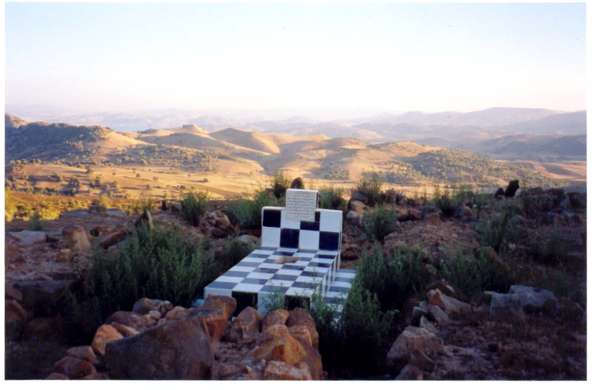
THE HANDSTAND
june 2005
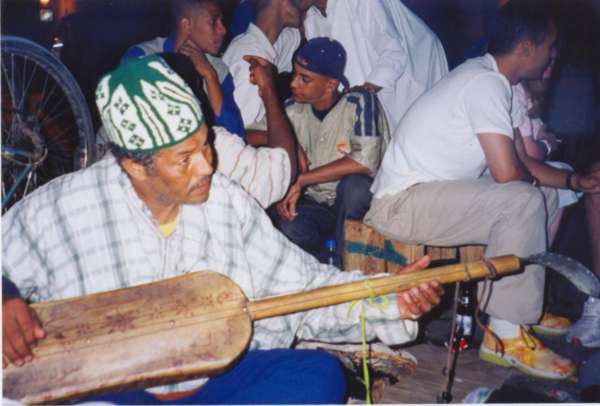
hassan l'gadiri, gnoua master gimbriplayer on djemma el fna, marrakesh, photo frank rynne.
The Master Musicians of Joujouka and Mohamed Hamri By Frank Rynne
Ornette Coleman's Rubber Boots
My Adidas have bust soles, it's raining and I have to go to the mountains. I'm sitting in the Cafe of Glass in the Socco Grande with Boualem. I ask him about shoe prices and tell him my predicament.
‘You need to go up there, ...’ he points across the square to a small market street.
‘...... buy one pair of rubber boots for Joujouka, it cost only 20 Dirhams. I remember, in the time when Ornette Coleman come to Joujouka, it be rain, rain, and rain. 20 and 5 days it rained nearly all the time. Me, I went to Ksar El Kebir. I bought me 15 or 20 pairs of rubber boots and sell them in Joujouka for 50 dirhams, even $10. I sold them all. Afterwards it stopped raining and when they left they left all the boots in Joujouka.’
‘So you got them all back ?’ I ask.
‘No’ he says emphatically. ‘The musicians they get them, Manaref, me I makes some money.’
Scarface
From the nearby mountains they come and work as thieves, dealers, and hustlers on the streets of Tangier. The boys with the scared faces. These boys have horrific razor scars on their faces which makes them even more intimidating when they jump out of the shadows saying
‘Hello my friend. You want something?’ These boys are more pushy and more in your face. There is a desperate energy burning off them. They are marked out as trouble.
I asked Rachid at my hotel in the Medina about the boys with the scar faces, who did it - the cops ?
‘No, No, these are from the Djibil mountain, it's a mountain thing. They put a razor or a piece of metal between their fingers and it's like a caress. They just rub the hand across the face of one of their gang. No one sees the blade and after, the face is cut wide open. Sometimes they put metal dust or something on the blade and this makes it not heal.... infected, you know.’
‘What's it all about, why would they do a guy like that ?.’ Rachid a native Tangerine throws up one hand in a dismisive gesture
‘These mountain people are crazy.’
Boy stabs Boy
The Socco Chico is a small square where many medina streets meet. The medina is hilly and the Socco Chico is about half way down a hill that ends at the port. The Pension Fuentes faces the Cafe Central, the Meet Cafe in Burroughs' Naked Lunch. The boy hustlers congregate in the Socco and smoke hashish on the Fuentes cafe balcony.
One afternoon I passed through the Socco and saw a major melee. There were about 20 boys fighting. Two boys were doing most of the fighting. I couldn't see too clearly and kept moving on up the hill towards The Socco Grande. The street was filled with perplexed mountain woman and madly shouting waiters. Then everyone was silenced by an inhuman scream followed by two more. My skin prickled. Everyone stopped fighting and ran, leaving a bleeding youth writhing momentarily in the dirt at the side of the Cafe Central.
Later I discovered that the boy was killed with a large sewing needle used for leather. It punctured his heart three times. The boy who did the killing was arrested about ten minutes later on Avenue Espania. He ran, blood-soaked, straight into two Gendarmes.
That night he hung himself in his cell in Tangier Prison. No names were mentioned. These were anonymous boys. Two more mountain boys. Next day life returns to normal the on the Socco Chico.
The Cafe of Glasses 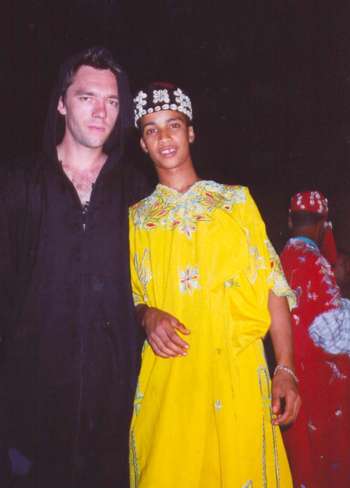
In the Cafe of Glasses 50 men smoke sepses and watch Spanish TV. Several of them are absent 5 times a day at the Mosque ten feet away. Many never stir from a.m. till 10pm when the cafe shuts.
I can get a days credit on a coffee from Mohamed the one eyed waiter. I can smoke kif forever with the old men who are always friendly and good for a laugh. Some are very confused as to what or who the hell I am. This is not a place tourists ever settle down for a coffee. This is a haven for the unwashed. The unwanted kif smokers of the Grand Socco.
Boualem
sets up a small stall on the Socco and sells everything
he can lay his hands on, from watches to clothes. He
seems to be more industrious than any other time I've
been in Tangier.
Frank rynne with le petit gnoua, djamma el fna marrakesh
Abduslam is a small Chinese Moroccan. Boualem tried to tell me where he was from but eventually I had to intercede and say he's un Chinois. Abduslam is very small and looks like an Asiatic Rasta man. In fact he looks like Lee Perry. He speaks two or three words of English, and is rarely able to keep his head or a conversation up for long.
Some of the men play drafts and cards. The drafts pieces are bottle caps. Play is often long, always fast and a game is followed by loud shouts of victory or consternation. The overseers are two Mohamed's, One-Eyed Mohamed and Young Mohamed. Young Mohamed is from the mountains near Cap Spartel and has invited me many times to stay there. He stays behind the counter making mint tea and Arabic coffees, One-Eyed serves the drinks and collects the cash and glasses which he also washes. All the hot drinks are served in tall glasses. The coffee is boiled not percolated and a sediment of a 1/2 inch of grounds is always left in the bottom.
The
cafe is for hard core kif smokers. Kif is a mixture of
home-grown black tobacco and Marijuana flower heads
finely chopped together so that the kif is almost dust.
Preparing your own kif with your own proportion of
tobacco is a long and tedious task but it is the type of
repetitive boring task that Marijuana makes bearable.
First the flower heads are selected and all the twigs are
removed. Moroccan Marijuana contains a lot of seeds and
these must all be removed, leaves are not smoked here,
just flowers, pollen and petals. The taste of kif is
often disagreeable to Westerners due to the tobacco which
is oily and strong. Kif is smoked in a long pipe which
usually breaks into two pieces for concealment and which
has a small removable earthenware bowl. This is the
Moroccan Sepsee.
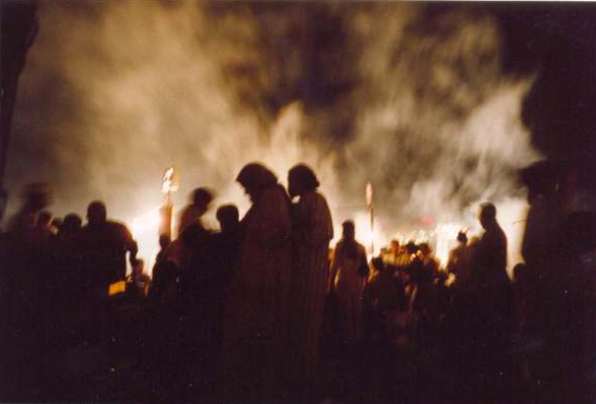
Ayachi
Ayachi used to be a Master Musician. He is from the village of Joujouka, a beautiful place in the Al Sherif Mountains. He is related to all the musicians I know. His mother was an Attar, one of the predominant families in Joujouka. There are many branches of the Attars and in recent years there has been great trouble amongst the musicians of Joujouka over a claim by one Attar that he and his immediate family are the only musicians of the village.
Ayachi is tall and good looking man, of about 50. I meet him one rainy afternoon in the Cafe of Glasses. Boualem introduces us and tells me Ayashi's pedigree. Ayashi wants to know if I know Ricky Stein. I tell him of a long phone call I had with Stein a few years back, and that Stein is doing well in the World Music business. Ayachi starts saying ‘ Rick-ki, Rick-ki, Rick-ki..’ He starts to laugh.
It turns out that Ayachi had been on the infamous 30 man Joujouka tour of the early 80s. We begin to talk about the other people we both know, the infamous Mujehid Mujdoubi occupying much of our talk as the sun sets on the streets of Tangier.
Mujehid
I only knew Mujehid for a short time before he died. When I first arrived in Joujouka with Hamri it was early October. The weather was beautiful and hot but there were water shortages. Every night Mucktar would head up into the mountains with a mule and about fifty 5 litre cans to collect water. Someone else's water I guessed but no one said anything about it. For the first five days I heard much talk of Mujehid but he wasn't to be seen. Old Haj and some others ancients came to sit with the musicians and me. They must have sent a favourable enough report back to the wily old master.
Mujehid's son Muinir was always around, a sixteen year old boy drummer, the butt of many of the musician's jokes. One day I was out for a walk with Muinir, when we returned Ansari warned Muinir that his father was there and told me to come. Mujehid was here.
All this awe and respect set me thinking that this man must be very special but Hamri had never said anything to me about him. I turned the corner of the porch to see a beaming Hamri sitting in a wicker chair. Shira was playing a low flute into the ear of an old man who was undoubtedly very handsome and poised. He was tall and thin of about 80 years old.
Mujehid looked at me and then stood up laughing and shook my hand. He said something in Spanish. I told him ‘No hablo Espaniol.’
‘Hada Frank. That's Frank’ Hamri said.
‘Wahid Frank Hada mashie mesyen one Franc not good’ Mujehid said and sat down. Muinir stayed off the porch trying to avoid slighting his father in any way. I was to sit next to Mujehid. He had on a beautiful brown Djellaba and was turned out very well.
With Hamri translating, Mujehid interrogated me for a while and then went into a long rant which had all the musicians laughing. Hamri translated little bits for me between belly laughs. Mujehid was free-styling. He could, I subsequently learned, keep this up for hours.
Hamri said ‘In Morocco you know what one frank is? It's nothing, it be money but it's is so small that there isn't a coin for one franc any more. The smallest coin is for 10 francs. Mujehid he says he wants to have nothing to do with you. If he saw one franc on the ground he wouldn't even pick it up. It useless, you couldn't even buy one sweet, nothing. Why they call you Frank?’
At
times Mujehid would turn to me and talk directly at me in
Arabic I couldn't understand. Hamri spoke.’ He say
you have beautiful white skin, he wants to marry
you.’ The musicians played and Mujehid made a few
comments about the rhythms and the way the flutes should
be, no one contradicted him in this respect and I began
to understand his role. He was the guardian of the Sufi
music of Sidi Achmed Sheich. He was the musical leader of
the group. He was the Old Man of the Mountain.
Mujehid and the Irish Goat
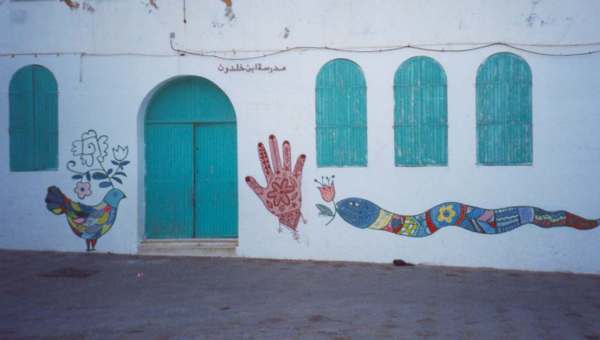
After a few meetings Mujehid asks where I am from. Mohamed Attar, known as Ansari, had been to Dublin for The Here to Go Show and said ‘Dub..Linn.’ I said ‘Ireland.’ Mujehid started laughing. ‘I've been to Ireland with Ricky.’
Hamri asks some questions. After Mujehid has talked a while Hamri asks me ‘What's this swimming pool full of milk Mujehid says he saw in Ireland.’ I am baffled but then I discover this pool was on a big farm and made of aluminium.
‘That's just the storage cooler for the milk that all big farms would have, to keep it cool before it's collected.’
‘Mujehid says, no, it was too much milk for that, millions of litros.’
‘But that's how much milk a few hundred cows would give a day. Ireland is a big dairy producer.’
‘The cows here in Joujouka, if you were lucky would give you half a cup a day at this time of the year, this is why he can't believe you.’ The milk is soon forgotten as Mujehid has remembered a big deficiency he had noted in the Irish.
It turned out that one day the Masters of Joujouka went to a big estate somewhere in the west of the country to help heal a young girl with their music. The musicians duly played the Rites Of Boujeloud and the healing music of Sidi Achmed Sheich and an improvement was noticed in the girl. The next day the girl's father took Mujehid to the town and bought him a goat for the musicians to kill and eat. Mujehid set off alone towards the big house holding the goat. He was not given to carrying goats in his arms. In Joujouka you simply walk behind them and they generally behave. Where would they go to ? He set the goat down. This Irish goat, full of the spirit of rebellion, took off down the road like a bullet. Mujehid chased it back into town. He eventually lost sight of the musicians dinner. He came up to some of the natives but soon discovered that not one of them had a word of Magrebi, not a single word. Mujehid tried to mime what had happened making horns on his head with his fingers, but no one could work out what he wanted and he never got his goat back.
Years
later in Joujouka he wants to know one thing, ‘How
come those Irish people couldn't speak Magrebi?’
Frank Rynne is a singer, musician, record producer,
film maker, writer and art
curator. He was lead singer, guitarist and songwriter for
The Baby Snakes. He
co-curated the 1992 Here to Go Show at The Project Arts
Centre, Dublin which
featured the paintings of William Burroughs, Brion Gysin
and Mohamed Hamri.
Working in close collaboration with Mohamed Hamri, who
brought Brian Jones,
Ornette Coleman, Brion Gysin, Paul Bowles etc to Joujouka
he produced two CDs
of The Master Musicians of Joujouka, Joujouka Black Eyes
and Sufi, which
features the Gnoua Brotherhood of Marrakesh. Co-producer
of 10%:file under
Burroughs which featured Bill Laswell, Scanner, Chuck
Prophet, Stanley Booth,
John Cale, Marianne Faithful, and more. As a member of
Islamic Diggers he has
worked with Anita Pallenberg, Howard Marks, Stakker/Aphex
Twin, Richard Hell,
and Lydia Lunch. Co-directed with Joe Ambrose Destroy All
Rational Thought. Co
-wrote with Joe Ambrose and Terry Wilson Man from Nowhere
storming the citadels
of Enlightenment with William Burroughs and Brion Gysin.
Frank has lived in
London, Paris, and Morocco. He currently resides in
Dublin where he has just
completed an honours degree in history at Trinity College
and has been accepted
for post graduate research on the Irish revoluntionary
organisation the Fenians/
Irish Republican Brotherhood. He continues to work with
The Master Musicians of
Joujouka.
Hamri's Grave,all photos by
Frank Rynne
